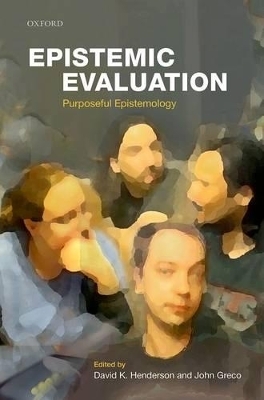
Epistemic Evaluation
Purposeful Epistemology
Seiten
2015
Oxford University Press (Verlag)
978-0-19-964263-2 (ISBN)
Oxford University Press (Verlag)
978-0-19-964263-2 (ISBN)
Twelve leading philosophers explore and apply a particular methodology in epistemology, which might be called purposeful epistemology. The idea is that considerations about the point and purpose of our concepts (or epistemic norms) promise to yield important insights for epistemological theorizing.
Epistemic Evaluation aims to explore and apply a particular methodology in epistemology. The methodology is to consider the point(s) or purpose(s) of our epistemic evaluations, and to pursue epistemological theory in light of such matters. Call this purposeful epistemology. The idea is that considerations about the point and purpose of epistemic evaluation might fruitfully constrain epistemological theory and yield insights for epistemological reflection. Several contributions to this volume explicitly address this general methodology, or some version of it. Others focus on advancing some application of the methodology rather than on theorizing about it. The papers go on to explore the idea that purposes allow one to understand the conceptual demands on knowing, examine how purposeful epistemology might shed light on the debate between internalist and externalist epistemologies, and further develop the idea of purposeful epistemology.
Epistemic Evaluation aims to explore and apply a particular methodology in epistemology. The methodology is to consider the point(s) or purpose(s) of our epistemic evaluations, and to pursue epistemological theory in light of such matters. Call this purposeful epistemology. The idea is that considerations about the point and purpose of epistemic evaluation might fruitfully constrain epistemological theory and yield insights for epistemological reflection. Several contributions to this volume explicitly address this general methodology, or some version of it. Others focus on advancing some application of the methodology rather than on theorizing about it. The papers go on to explore the idea that purposes allow one to understand the conceptual demands on knowing, examine how purposeful epistemology might shed light on the debate between internalist and externalist epistemologies, and further develop the idea of purposeful epistemology.
David Henderson is Robert R Chambers Distinguished Professor of Philosophy at the University of Nebraska-Lincoln. John Greco holds the Leonard and Elizabeth Eslick Chair in Philosophy at Saint Louis University.
PHILOSOPHICAL METHODS AND EVALUATIVE PURPOSES; CONTEXTUALISM AND PRAGMATIC ENCHROACHMENT; DOES KNOWLEDGE ALWAYS REQUIRE REASONS?; THE INTERNALISM/EXTERNALISM DEBATE; EPISTEMIC NORMS AS SOCIAL NORMS
| Erscheint lt. Verlag | 1.10.2015 |
|---|---|
| Verlagsort | Oxford |
| Sprache | englisch |
| Maße | 174 x 240 mm |
| Gewicht | 618 g |
| Themenwelt | Geisteswissenschaften ► Philosophie ► Erkenntnistheorie / Wissenschaftstheorie |
| ISBN-10 | 0-19-964263-X / 019964263X |
| ISBN-13 | 978-0-19-964263-2 / 9780199642632 |
| Zustand | Neuware |
| Haben Sie eine Frage zum Produkt? |
Mehr entdecken
aus dem Bereich
aus dem Bereich
die Grundlegung der modernen Philosophie
Buch | Softcover (2023)
C.H.Beck (Verlag)
18,00 €
Buch | Softcover (2023)
Reclam, Philipp (Verlag)
7,00 €

![Was heißt Denken?. Vorlesung Wintersemester 1951/52. [Was bedeutet das alles?] - Martin Heidegger](/media/113619842)
